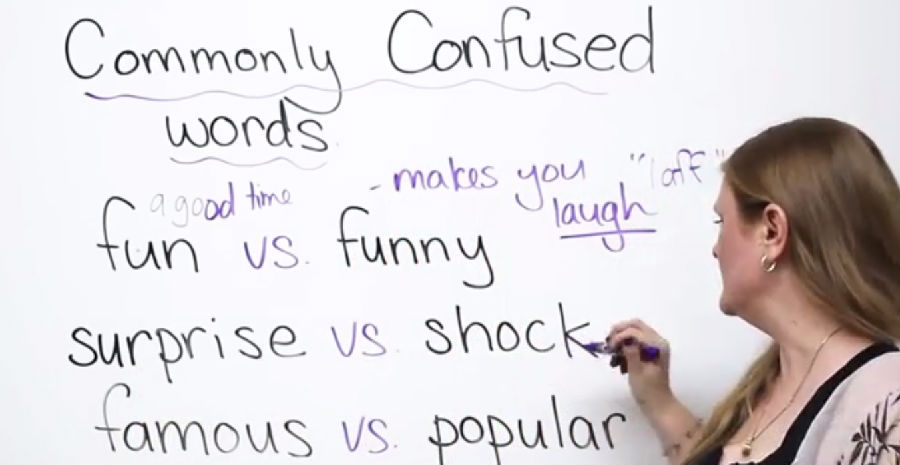(单词翻译:单击)
Commonly confused words!You will maybe mix up words.These words are very close in meaning, but they're actually different.
经常被弄混的词!你可能会把不同的单词弄混。这些词在意思上很接近,但是它们其实是不一样的。
My name's Ronnie, I'm going to help you figure out some four...six words that are confusing in English, and you think maybe they're even the same word.
我叫 Ronnie ,我要帮助你弄清楚四......六个在英语中很容易弄混的单词,你甚至可能会认为它们是同一个意思。
They are not the same word.They are different, they have different meanings.Don't ever get them wrong again.
它们并不是同一个意思。它们并不相同,它们有着不同的意思。永远不要再把它们弄错了。
Okay, so, commonly confused words.The first one is "fun", and you confuse this with "funny".And I say, "What's the difference between 'fun' and 'funny'?"
好了,我们今天要讲的就是经常被弄混的单词。第一个是 "fun" ,你会把它和 "funny" 弄混。我要问:“ 'fun' 和 'funny' 之间的区别是什么?”
And you say, "Oh, I know...'fun' is an adjective."It's the police again, they've come to get me, we're having too much fun.
你说:“啊,我知道, 'fun' 是个形容词。”警察又来了,他们是来抓我的,我们玩得过于开心了。
And I say, "Well, if 'fun' is an adjective, what kind of word is 'funny' then, hmm?"
我问:“好吧,如果 'fun' 是形容词,那 'funny' 又是什么词呢?哈?”
And you go, "Oh, it's an adjective, too."So what's the difference?
你说:“哦,它也是一个形容词。”那它们之间有什么区别?

The difference is "fun" means you are having...woohoo, a great, great time doing something.
区别就是,"fun" 的意思是你做某事做得非常非常开心。
You are having fun, it's great.Maybe you are drinking.
你很开心,感觉很棒。也许你在喝酒。
Maybe you are watching English videos, maybe you are studying.
也许你在观看英语视频,也许你在学习。
I really wouldn't think that studying would be fun, but learning on the internet is fun.
我实在不觉得学习有什么好玩的,但是在网上学习很好玩。
Then we have "funny.""Funny" means it makes you laugh.If something is funny, you will laugh.
然后是 "funny" 。"funny" 的意思是它让你捧腹大笑。如果某件事很搞笑,你就会笑出来。
A lot of people say "I went to Disneyland and it was funny."Oh, why, what happened?"We went on a roller coaster."
很多人说“我去了迪士尼乐园,非常 funny 。”啊,为什么?发生了什么?“我们坐了过山车。”
Uhhh, okay, but a roller coaster's not "funny".
额,好吧,但是过山车不能用 "funny" 来形容。
If I went to an amusement park, I wouldn't look at a roller coaster and go, "Hahaha...what, what, what, look at it, it's a roller coaster, it's funny."
如果我去了一个游乐园,我不会看着一个过山车说:“哈哈哈,快看,那是个过山车,太搞笑了。”
No, you would go on the roller coaster and go "Woo hoo! It is fun."
不,你会坐上过山车,然后说:“哇哦!太好玩了。”
So, difference, "fun" means, basically, a good time -- "I'm having a good time." -- versus "funny" -- it makes you laugh.
所以区别就是,"fun" 基本上指的是欢乐的时光,比如“我玩得很开心。”,与此相对的,"funny" 的意思是它会令你大笑。
This word looks like "la ha uhghhjg" but the pronunciation is actually "laugh".
这个单词看上去读音像 /lahauhgh/ ,但它其实读作 /laef/ 。
"Fun" means it's a good time, like at a party."Funny" means it makes you laugh.You can have both together.You can go to a party.
"fun" 指的是玩得开心,比如在派对上。"funny" 指的是它会令你大笑。可以把这两个词用在一起。可以去参加一个派对。
The party can be super fun, and someone at the party could be funny, maybe there's a clown, clowns can be funny.
派对可能超级好玩,派对上可能有个人很搞笑,可能那儿有个小丑,小丑挺搞笑的。
Next one is "surprise" versus "shock."I hear a lot of people say, for example, "I went home last night, and I saw my mom and my dad naked, I was surprised."
下一组是 "surprise" 和 "shock" 。我听到很多人说,举个例子:“我昨晚回家的时候看到我妈妈和我爸爸光着身子,我感到很惊奇。”
Were you having a party?Are you getting out a camera, "Hi Mom, hi Dad, what's up....?"
你是在开派对吗?你难道要拿出相机对着他们说:“嗨,妈妈,嗨,爸爸,你们好吗?”
No, no, no, no, you were not "surprised" surprise.
不不不不,你在这里不能用 "surprised" 来表达你的惊讶之情。
You were scarred for life.You were in "shock" or, in the past tense, you were "shocked".
这给你带来了终生的创伤。要用 "in shock" 或过去式 "shocked" 来表示你的震惊。
You weren't happy about something, you were "shocked".So, "surprise" we always use for a positive event.
当你对某件事感到不是开心的那种惊讶时,要用 "shocked" 。所以,我们总是用 "surprise" 来表示开心的活动。
For example, if you bought a lottery ticket and you won, "Surprise! You have a million dollars!"Cool! Compared to "shocking" news.
举个例子,假设你买了张彩票,而且中奖了,这时候别人就会说:“惊喜吧?你中了一百万!”太酷炫了!与此对比的是“令人震惊的消息”。
Let's say that you just got a phone call that your friend is in the hospital, because they got hit by a donkey.
我们假设你刚接到了一个电话,人家说你的朋友现在在医院里,因为他被驴踢了。
"Surprise! Your friend got hit by a donkey"."No, I'm shocked! My friend got hit by a donkey."
“惊喜吧?你的朋友被驴踢了。”应该说:“不,我很震惊!我的朋友竟然被驴踢了。”
"Surprise" is always positive."Shocked" is always a bad thing, or a negative situation.
"surprise" 表示的总是好事。"shocked" 表示的总是坏事,或者不利的情况。
On to the last one, "famous" versus "popular".These are very similar in meaning, but again, different.
来讲最后一组: "famous" 和 "popular" 。这些在意思上非常相似,但是再说一遍,它们是不同的。
"Famous" means many people know you or know someone.
"famous" 表示很多人认识你或认识某人。
So if you look at an example, you can take any president of the United States of America.
所以如果要举一个例子,你可以以任何一位美国总统为例。
I would wager a bet, any president, or prime minister in the world, most people would know their name.
我敢打赌,大部分人都知道世界上任何一位总统或总理的名字。
So if I took the President of Canada...we don't have a President of Canada.
如果我以加拿大总统......我们加拿大没有总统。
If I took the Prime Minister of Canada...nah, I don't want to take him.
如果我以加拿大总理......不,我不想以他为例。
If we took the President of America, if we took George W.Bush, the past president of America,
如果我们以美国总统,以美国前总统乔治·沃克·布什为例,
most people have heard of the word "bush" before, mmm-hmm...George W.Bush.
大多数人以前听过 "bush" (灌木丛)这个单词,可不是嘛...... 这是乔治·沃克·布什。
But, many people know this name; many people know the name "Bush".
但是,很多人知道这个名字,很多人知道 "Bush" 这个姓。
Popular: do you like George Bush, George W.Bush?
来讲 "popular" ,你喜欢乔治·沃克·布什吗?
I'm sorry, George W.Bush was very, very famous, but he was not popular.
很遗憾,乔治·沃克·布什虽然非常非常有名,但他不是很受欢迎。
"Popular" means many people actually like someone.
"popular" 的意思是很多人喜欢某人。
So people who are popular, they don't have to have a lot of people that know who they are, but they have to have a couple of people who actually like them.
所以受欢迎的人不一定要为众人所知,但是他们必须要有几个真的喜欢他的人。
Another example of someone who is "famous", but not "popular"-- again, it's all about the government, isn't it-- would be the famous, but much hated, Hitler.
另一个很有名但是不受欢迎的人的例子(这又是关于政府的)就是著名却深受痛恨的希特勒。
Everyone knows who Hitler is.I hope people don't like Hitler.Come on, really?This guy's terrible!So Hitler is famous but not popular.
每个人都知道希特勒是谁。但愿大家都不喜欢希特勒。别开玩笑了,真有人会喜欢他?那家伙坏透了!所以希特勒有名,但不受欢迎。
Maybe when you were in high school, there was the "popular" boy...who talked like this, and was so popular, okay?
或许你读高中的时候,学校有这么一个“很受欢迎的”男生,他讲话就是这个样子,而且非常受欢迎。
Or there was the "popular" girl.People liked the popular boy or the popular girl.
或者有这么一个“很受欢迎的”女生。大家很喜欢这个受欢迎的男生或受欢迎的女生。
But if you went to a different school and you said, "Hey, do you know Benny, the guy that talks like this?"
但是如果你去一个别的学校问别人:“嘿,你认识 Benny 吗?就是说话这个样子的家伙。”
They'd go, "No, I don't know Benny."Benny is well-liked or popular at your school, but many people don't know who he is.
他们会说:“不,我不认识 Benny 。”Benny 在你学校倍受喜爱或很受欢迎,但是很多人并不知道他是谁。
Famous -- popular, surprise -- shock, fun -- funny.That's all for now, www. engvid. com -- do a quiz.Bye.
我们今天讲的三组易混词分别是: "famous" 和 "popular" , "surprise" 和 "shock" , "fun" 和 "funny" 。今天就讲到这儿啦,请登陆 www. engvid. com ,做个小测验。拜。


